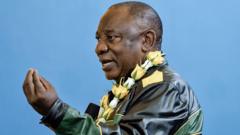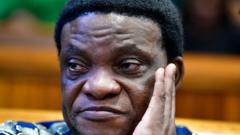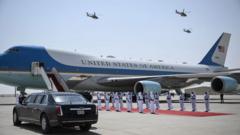As Cyril Ramaphosa prepares for his first White House meeting with Donald Trump, he aims to restore broken ties between South Africa and the US. With a history of successful negotiations, Ramaphosa faces the challenge of countering negative narratives while advocating for improved trade and diplomatic relations.
Ramaphosa's Diplomatic Gamble: Can Charm and Negotiation Bridge the US-South Africa Divide?

Ramaphosa's Diplomatic Gamble: Can Charm and Negotiation Bridge the US-South Africa Divide?
President Cyril Ramaphosa's meeting with Donald Trump represents a pivotal moment for mending US-South African relations amidst rising tensions.
President Cyril Ramaphosa's upcoming meeting with US President Donald Trump at the White House marks a critical juncture for South Africa's diplomatic relations with the United States, a relationship that has been increasingly strained in recent months. Known for his prior role as a negotiator during Nelson Mandela's efforts to end apartheid, Ramaphosa is expected to employ his renowned diplomatic skills in the pursuit of mending ties with the world's most influential leader.
The visit comes amidst accusations from Trump regarding the treatment of South Africa's white Afrikaner community, claims which have been widely debunked but nonetheless amplified by Trump's adviser Elon Musk. The friction escalated after Ramaphosa recently enacted a controversial land expropriation bill, further complicating interactions with the Trump administration.
Since taking office for his second term, Trump suspended crucial US aid to South Africa and extended an invitation for white Afrikaners to seek refuge in the United States, exacerbating discord between the nations. Additionally, the expulsion of South Africa's ambassador to the US, Ebrahim Rasool, following heated remarks about Trump's "mobilising a supremacism" added further tension.
Political analysts like Anthoni van Nieuwkerk characterize Ramaphosa's visit as a "high-risk strategy," with potential outcomes ranging from productive dialogue to a public relations disaster if emotions overshadow reason. The South African delegation aims to counteract disinformation while asserting the country's right to pursue its domestic policies without external interference.
Moreover, Ramaphosa's leadership style and ability to forge personal connections may play a crucial role, as he seeks to pivot the narrative towards mutually beneficial economic engagement, with discussions likely focusing on the extension of the African Growth and Opportunity Act (AGOA). Given that South Africa substantially relies on this legislation for trade, the stakes are high.
Ramaphosa's spokesperson expressed optimism that the visit could pave the way for normalising diplomatic relations, emphasizing that both nations have interconnected economic interests that create a foundation for cooperation. As reports indicate, the meeting is seen not as an immediate solution but as the beginning of a complex process towards restoring trust and partnership between Washington and Pretoria.
While South Africa is poised for constructive discussions on pressing issues, the meeting risks being overshadowed by sensitive topics, including the ongoing humanitarian crisis in Gaza and differing accusations at international platforms. Nevertheless, both nations are aware that a failure to foster a productive dialogue could jeopardize their respective standings within the global market and regional influence.
Should Ramaphosa’s visit succeed, it could not only redefine US-South African relations but also demonstrate the enduring power of diplomacy in navigating complex historical grievances.




















